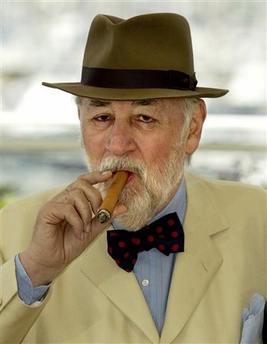Every year, it seems to me, editors and writers in print and digital outlets want to complete their year-end wrap-ups a little earlier. In fact, I’m pretty sure there were Thanksgiving leftovers still relatively fresh in my refrigerator when Entertainment Weekly released its “Late Greats”
cover-story tribute to showbiz luminaries who shuffled off this mortal coil in 2009.
But here’s the thing: Over the years, I have noticed that, during the last week of every December, long after the year-end wrap-ups are complete, another notable or two (or three or four) will join the Choir Invisible. And, unfortunately, these folks tend to get penalized for their untimely departures. For openers: When the bad news is broken on cable news networks, they get tributes only from B- and C-list talking heads, because the A-listers are on holiday. For much the same reason, the newspaper and magazine obits are scanty, because only second- and third-stringers – many of them too young to fully appreciate many older notables -- are still on the job.
(Maybe this is why, when
Philippe Noiret died on Thanksgiving Day in 2006,
my respectful tribute to the great French actor attracted more readers to this blog than almost anything else I've ever posted, before or since.)
Worse, the late celebrities leave this world too late to be included prominently in the really cool year-end newspaper, magazine and website tributes. And, really, they’re disqualified from being honored in wraps for the following year. As a result of their underpublicized departures – well, I have only anecdotal evidence to support this theory, but I suspect that, in many cases, the general public isn’t actually aware that an individual has died until the dead person pops up in one of the montages at the Emmys and Oscars.
Consider these dates of departure, chosen at random during a cursory riff through Wikipedia: Dean Martin, Dec. 25, 1995.
Eartha Kitt, Dec. 25, 2008. (Hell, for that matter, Charlie Chaplin, Dec. 25, 1977.) Jason Robards, Dec. 26, 2000. Alan Bates, Dec. 27, 2003. Hal Ashby, Dec. 27, 1988. Sam Peckinpah, Dec. 28, 1984. Jerry Orbach
and Susan Sontag, Dec. 28, 2004. Andrei Tarkovsky, Dec. 29, 1986. (OK, I realize that’s a bit of a reach, but still…) Lew Ayres, Dec. 30, 1996. Rick Nelson, Dec. 31, 1985. Donald Westlake, Dec. 31, 2008.
And now think about this: The odds are very good that, between now and 11:59 p.m., Dec. 31, at least one more significant showbiz figure will check out. And will not get the send-off he or she deserves.


